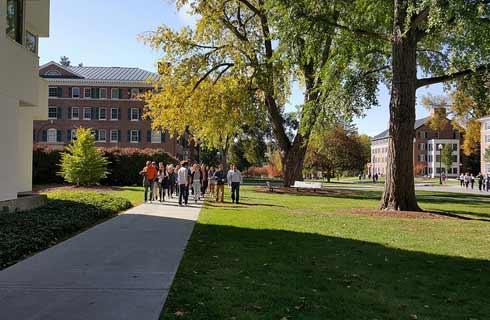国际学生入学条件
Admission to the graduate program in Religious Studies at UT-Austin is highly competitive. Only highly qualified applicants whose records indicate considerable academic potential are admitted to the program. A prior degree in Religious Studies (B.A. or M.A.) is not required to apply to the program.
All students must have earned a bachelor's degree prior to registration. In addition, note that:
We admit students for the fall semester only.
We only accept full-time students.
We offer the M.A. as the first step toward completion of the Ph.D.; we do not offer a terminal M.A. degree.
Three letters of recommendation
Statement of Purpose
Supporting documents - Writing Sample & CV/Resume
Transcripts. You must provide one copy of the academic transcript from every senior college you have attended. You may upload a copy of your transcript(s) after you have submitted your application for admission and paid the application fee. After you have submitted your application you will receive an email that contains a link to the Status Check web site where you will be able to upload your transcript. The uploaded transcript(s) is considered to be unofficial but will be used to process your application for admission. Please do not mail official transcripts or paper copies of your transcripts before you are offered admission. Sending paper copies of documents you have uploaded will significantly delay the processing of your application.
Report of GRE scores (not required) and (if applicable) official report of TOEFL scores.
TOEFL: 79 on the Internet-based test (iBT)
IELTS: An overall band of 6.5 on the Academic Examination
展开
IDP—雅思考试联合主办方

雅思考试总分
6.5
- 雅思总分:6.5
- 托福网考总分:79
- 托福笔试总分:550
- 其他语言考试:NA
CRICOS代码:
申请截止日期: 请与IDP联系 以获取详细信息。
课程简介
The graduate program in Religious Studies at the University of Texas is dedicated to the study of religious phenomena within particular cultural and historical contexts. At the same time, we expect research to be driven by theoretical and analytical questions and to employ the methodologies that facilitate them. Although the research agendas of our students need not be explicitly comparative, we recognize that comparison lies at the heart of our discipline and informs our theories and questions. As a result, we expect all of our students to be able to articulate comparisons across traditions, cultures, or regions, to develop knowledge of relevant theories, and to demonstrate a deep understanding of the specific social and historical contexts in which their research questions are embedded. This includes fluency in relevant languages as well as facility in at least two methodological approaches. We encourage our students to draw upon the vast theoretical, historical, and linguistic resources available in our department and throughout the rest of the University of Texas.<br>This area of concentration allows students to study religious traditions in specific historical and cultural contexts. The goal is to examine the historical articulation of religious phenomena in a specific geographical area and in relation to other relevant religious traditions. Students will develop the research methods necessary for their projects: these may include historical, philological, comparative, material, and literary analyses. They also will develop the theoretical and thematic approaches needed to articulate research questions and to explore the role of religion in particular societies and cultures. Each student will develop expertise in a second religious tradition: either religions in conversation within a specific geographical and chronological context or ones that inform a comparative project.
展开







 预科
预科 奖学金
奖学金 实习机会
实习机会 在校学习
在校学习 跨境学习
跨境学习 校园授课-线上开始
校园授课-线上开始 在线/远程学习
在线/远程学习














 田纳西大学
田纳西大学

 约克大学
约克大学

 南加州大学
南加州大学

 美国天主教大学
美国天主教大学

 亚利桑那州立大学
亚利桑那州立大学

 阿尔伯塔大学
阿尔伯塔大学









